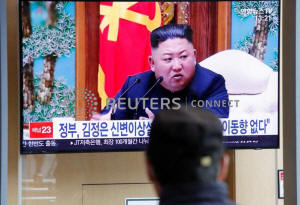Exclusive: China sent team including medical experts to advise on North
Koreaís Kim
 Send a link to a friend
Send a link to a friend
 [April 25, 2020]
BEIJING/SEOUL (Reuters) - China has
dispatched a team to North Korea including medical experts to advise on
North Korean leader Kim Jong Un, according to three people familiar with
the situation. [April 25, 2020]
BEIJING/SEOUL (Reuters) - China has
dispatched a team to North Korea including medical experts to advise on
North Korean leader Kim Jong Un, according to three people familiar with
the situation.
The trip by the Chinese doctors and officials comes amid conflicting
reports about the health of the North Korean leader. Reuters was unable
to immediately determine what the trip by the Chinese team signaled in
terms of Kim's health.
A delegation led by a senior member of the Chinese Communist Party's
International Liaison Department left Beijing for North Korea on
Thursday, two of the people said. The department is the main Chinese
body dealing with neighbouring North Korea.
The sources declined to be identified given the sensitivity of the
matter.
The Liaison Department could not be reached by Reuters for comment late
on Friday. China's foreign ministry did not immediately respond to a
request for comment late on Friday.
Daily NK, a Seoul-based website, reported earlier this week that Kim was
recovering after undergoing a cardiovascular procedure on April 12. It
cited one unnamed source in North Korea.

South Korean government officials and a Chinese official with the
Liaison Department challenged subsequent reports suggesting that Kim was
in grave danger after surgery. South Korean officials said they had
detected no signs of unusual activity in North Korea.
On Thursday, U.S. President Donald Trump also downplayed earlier reports
that Kim was gravely ill. "I think the report was incorrect," Trump told
reporters, but he declined to say if he had been in touch with North
Korean officials.
On Friday, a South Korean source told Reuters their intelligence was
that Kim was alive and would likely make an appearance soon. The person
said he did not have any comment on Kim's current condition or any
Chinese involvement.
An official familiar with U.S. intelligence said that Kim was known to
have health problems but they had no reason to conclude he was seriously
ill or unable eventually to reappear in public.
A U.S. State department spokeswoman had no comment. U.S. Secretary of
State, Mike Pompeo, when asked about Kim's health on Fox News after
Trump spoke said, "I donít have anything I can share with you tonight,
but the American people should know we're watching the situation very
keenly."
[to top of second column]
|

South Korean people watch a TV broadcasting a news report on North
Korean leader Kim Jong Un in Seoul, South Korea, April 21, 2020.
REUTERS/Heo Ran/File Photo

North Korea is one of the world's most isolated and secretive
countries, and the health of its leaders is treated as a matter of
state security. Reuters has not been able to independently confirm
any details on Kim's whereabouts or condition.
North Korea's state media last reported on Kim's whereabouts when he
presided over a meeting on April 11. State media did not report that
he was in attendance at an event to mark the birthday of his
grandfather, Kim Il Sung, on April 15, an important anniversary in
North Korea.
Kim, believed to be 36, has disappeared from coverage in North
Korean state media before. In 2014, he vanished for more than a
month and North Korean state TV later showed him walking with a
limp. Speculation about his health has been fanned by his heavy
smoking, apparent weight gain since taking power and family history
of cardiovascular problems.
When Kim Jong Un's father, Kim Jong Il, suffered a stroke in 2008,
South Korean media reported at the time that Chinese doctors were
involved in his treatment along with French physicians.
Last year, Chinese President Xi Jinping made the first state visit
in 14 years by a Chinese leader to North Korea, an impoverished
state that depends on Beijing for economic and diplomatic support.
China is North Korea's chief ally and the economic lifeline for a
country hard-hit by U.N. sanctions, and has a keen interest in the
stability of the country with which it shares a long, porous border.
Kim is a third-generation hereditary leader who came to power after
his father Kim Jong Il died in 2011 from a heart attack. He has
visited China four times since 2018.

Trump held unprecedented summits with Kim in 2018 and 2019 as part
of a bid to persuade him to give up North Koreaís nuclear arsenal.
(Reporting by Beijing newsroom, Hyonhee Shin, Steve Holland, Mark
Hosenball, David Brunnstrom)
[© 2020 Thomson Reuters. All rights
reserved.] Copyright 2020 Reuters. All rights reserved. This material may not be published,
broadcast, rewritten or redistributed.
Thompson Reuters is solely responsible for this content. |